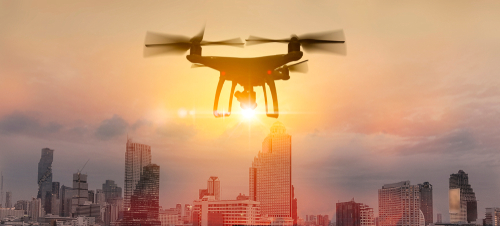
Congress backed away from restrictions on drone purchases from Chinese manufacturers in the final push to approve the 2021 National Defense Authorization Act (NDAA), but there is still concern on Capitol Hill that measures must be taken to close a potential espionage peephole that could be built into these increasingly versatile unmanned aircraft.
The American Security Drone Act, S. 2502, was introduced in late 2019 by U.S. Sen. Rick Scott (R-FL) and remains alive in the U.S. Senate after being approved by the Senate Homeland Security and Governmental Affairs Committee in September. The bill is similar to the provision in the sprawling NDAA that would have prohibited the federal government from acquiring drones built in China or other nations considered to be potential threats to the United States.
There was no immediate change in the status of S. 2502 after the passage of the NDAA, although Scott’s office said in a written statement to Homeland Preparedness News that drone cybersecurity was an issue that needed to be addressed. “Senator Scott is frustrated his American Security Drone Act wasn’t included in this year’s NDAA, but he is not giving up and continues to work to quickly ban the government’s use of Chinese-made drones,” said the statement. “It’s time to wake up to the threat of Communist China and protect national security and the privacy of Americans; every member of Congress needs to put the safety of Americans first and get this done.”
In removing the outright prohibition from the NDAA, the leadership of the House Armed Services Committee instead urged the Department of Defense to “secure our supply chain from over-reliance on foreign adversaries” and encourage the development of the domestic drone industry.
Banning the purchase of drones from China is not an overt gesture to protect U.S. manufacturers and save jobs. Supporters of the prohibition instead see the “Made in China” label as a license to steal for the benefit of China’s intelligence apparatus. Drones, they contend, could be fitted at the factory level with electronics that could secretly feed information about their missions directly to Beijing. The data and images collected by the aircraft could include details about natural resources, critical infrastructure and disasters that China’s spies could find useful.
“Without congressional action, adversaries like China and Iran will use drone technology as tiny Trojan Horses to spy on our government, our critical infrastructure – even our hospitals and homes,” U.S. Sen. Richard Blumenthal (D-CT) said when the bill was first introduced. “This bill will ensure that we don’t send China and others a gold-plated, flying invitation to steal our intellectual property, undermine our domestic technology, and spy on our communities.”
The Department of the Interior in January went so far as to formally ground its entire fleet of more than 800 drones, citing potential cybersecurity risks. The agency uses drones for a variety of purposes, including land and wildlife surveys and in aerial reconnaissance of wildfires.
Since then, drone manufacturers have been pushing back on the notion that imports pose a problem. The Chinese manufacturer DJI has led the charge contending agencies could easily have technicians look for suspicious components, and also that hackers could break into the software of a drone made in the United States as easily as they could a Chinese product.
A Dec. 8 op-ed piece in The Hill, authored by representatives from the Information Technology and Innovation Foundation, explained that the risk of drones secretly transmitting sensitive information to China is “minimal for many reasons, including the fact that most drones are not connected to the internet and drone operators could inspect any network traffic from these devices to quickly pinpoint any nefarious activity.”
The conservative Heritage Foundation responded in The Hill on Dec. 10 by painting China as a “bad actor” and scolding Congress for supposedly caving in to pro-Chinese lobbying. “While there’s a small chance Congress could still separately pass the drone legislation, any action will likely shift to the executive branch,” said the article, penned by the think-tank’s national security experts.
President Donald Trump could order the Interior Department’s ban expanded to cover other federal agencies, including the Pentagon. While there has been no indication from the White House that Trump is preparing to take such a step, he has threatened to veto the NDAA over other objections. The current bill passed with a veto-proof 355-78 majority; however a rejection by Trump could put the ban back in play or at least generate some new support for the American Drone Security Act among congressional conservatives and among Democrats who wish to quickly wrap up the debate over the important spending bill before the end of the year and before President-elect Joe Biden takes office.




